HIT CHANNEL EXCLUSIVE INTERVIEW: February 2025. We had the great honour to talk with a very talented musician: Jim McCarty. He is most well-known as the drummer and founding member of The Yardbirds, one of the most influential bands of the ‘60s. Three of greatest guitarists of all time had been members of The Yardbirds: Eric Clapton, Jeff Beck and Jimmy Page. Jim McCarty after the break up of The Yardbirds in 1968, he co-found Renaissance, Illusion and Box of Frogs. He has also released three full-length solo albums and his latest single is called “Breath of the Wind”. Read below the very important things he told us:
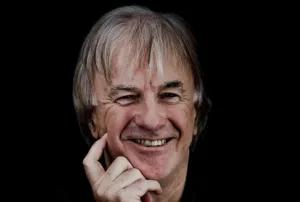 “Breath of the Wind” is your newest song. What inspired you to write this?
“Breath of the Wind” is your newest song. What inspired you to write this?
I recently lost my wife, she had cancer and she died about four years ago. I was looking into what happened to her and I managed to make a contact with her, because we were very close. I thought: “I’ll do a song about her and about what happened. I‘ll do a song about communicating”, which was nice. I remember going to a medium and she came through in a session with the medium and she said that I ‘ve written a song for her and I had the song “Breath of the Wind”. The medium said: “I would like to hear that”, so, I sent the demo and she said: “Oh, that’s a great song”. So, I worked it up a bit more and that’s how it happened.
What is the latest news from The Yardbirds camp?
The latest news is we start a tour at the end of March in the US, so, I will play a Beatles Fest in New Jersey, which is two or three days and then with The Yardbirds will do some touring for about two weeks. We do a new show now: I talk about the history of the group and then we go to the songs as they come up, we play the song and we have a back projection showing where we played, who we played with and all that sort of stuff. So, it’s a multimedia show.
In your opinion, what makes the music of The Yardbirds still relevant in 2025?
Yes, it’s a slight mystery. I don’t know, but probably the fact that when we were creating music, we were always trying to look into the future. I don’t know how to explain it, but basically we were just having fun and making the music different. I suppose we are lucky that the music does still go on and it never sounds old.
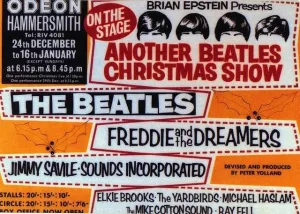 What did you discover during the writing process of your latest book “She Walks In Beauty” (2021)?
What did you discover during the writing process of your latest book “She Walks In Beauty” (2021)?
What did I discover? That was more of the subject of the song, the “Breath of the Wind”; I found it very interesting because I started studying mediumship and near-death experiences and I came to the conclusion that my wife was still around and her consciousness was still carrying on and it’s like this for everybody: When we die, we don’t really die, we are still present but just in another form. So, it was a whole new study and it was very interesting for me to do that. It was very nice to get into all that stuff.
How helpful were for The Yardbirds the Christmas shows at the Hammersmith Odeon supporting The Beatles in December 1964/ January 1965?
(Laughs) Yes, it was a very lucky break because we were not really that well-known, but we were quite well-known in that area, in South West London. We used to play in a place called Richmond and when The Beatles did the show they were playing in Hammersmith, which is not very far away from Richmond, it’s just a few miles, so, we were the local group. We played with other groups but they were all from Liverpool like Freddie and the Dreamers and other Liverpool groups managed by Brian Epstein (ed: The Beatles manager). Also, there was a publisher (ed: Ronnie Beck) in the audience that had a demo of “For Your Love” written by Graham Gouldman (ed: later vocalist and bass player of 10cc), who was a young writer from Manchester, younger than us, and they were trying to find someone to do it and he thought The Yardbirds would suit the song. From there, we heard the demo of “For Your Love” with our manager who lived in London and we thought that it was a great song and we decided to record that because we were looking for a hit record. Yes, it was very satisfying for us to do the shows, but of course when The Beatles played, it was very noisy, because there were a lot of screaming people. The Beatles just messed around a lot of the time, because you couldn’t really hear what they were playing, it was so loud in the room (laughs), but they were good fun and we spoke to them and they were very interesting, you know, they were nice.
I know that John Lennon made a demo of Chuck Jackson’s “The Breaking Point” (1961) for The Yardbirds. How did it come about?
Yell, it wasn’t a demo, it was already a single and we were looking for a hit record as I said and we thought maybe The Beatles would write us one, that was sort of hinted, but John Lennon had that song “The Breaking Point”, which was a single release on a 45 and he gave us that. That wasn’t particularly written for us, it was written by Burt Bacharach, it was a good song but it wasn’t really what we were looking for.
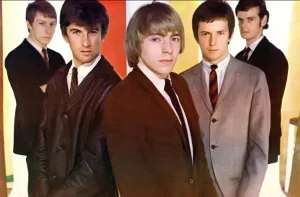 Did you expect the commercial success of “For Your Love” (1965) single?
Did you expect the commercial success of “For Your Love” (1965) single?
Yes, we thought that it would be successful. We liked the demo version, the Graham Gouldman version and when we recorded it, it was quite interesting because we used a harpsichord and not a real bass, a bowed bass mainly in the record and bongos and it sounded great in the studio. We always thought: “This is gonna be a hit, it sounds so good”.
You co-wrote “Still I’m Sad” (from “Having a Rave Up” -1965) with Paul Samwell-Smith (bass). Please tell us a few words about this great song.
Well, we had all sorts of influences that we liked. We liked a lot of different classical music and we thought that it was particularly nice to hear Gregorian chanting from monks in a monastery, it was very relaxing sound to hear and it was very evocative. That was one of the things we liked, so, we thought that we’d do something in that style. Paul and I wrote the song together, basically, it was a very simple song in a minor key about being sad because you lose a girlfriend (laughs)
Do you like the Rainbow cover to “Still I’m Sad” (on “Ritchie Blackmore’s Rainbow” -1975)?
Yeah! Yes, it’s such a great tune, quite a few other people have done it. Ritchie did it and he did a nice version, yeah, Rainbow. There are other versions, I can’t remember who did it (ed: Boney M.) but there are chanting, singing vocals which are nice.
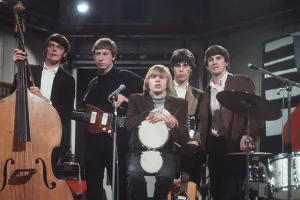 Why “Roger the Engineer” (1966) album is so special to you?
Why “Roger the Engineer” (1966) album is so special to you?
It was the first real album that we’d go in to record. We had an album live at the Marque (ed: “Five Live Yardbirds” -1964), which was a live show and then the albums that the record company released they were always compilations of songs and we hadn’t had a chance to do an album all together and go in the studio. We had a lot of fun because we played some of the songs live, so, we developed them in the studio and some of the songs we made up. So, we had a lot of fun and a lot of laughs and I think that combination came up well and of course Jeff Beck was really very good on that particular recording, he played some great stuff.
The Yardbirds turned a lot of English listeners on to American blues artists like Sonny Boy Willamson, Howlin’ Wolf and Eddie Boyd. Did you have trouble being accepted by a larger audience?
It was interesting because in America the people hadn’t really heard those songs because they were all from the Black musicians and the Black music wasn’t that well-heard, because it was a different circuit; the white people didn’t go to see the Black music, it was separated. So, people in America thought it was our music, they didn’t understand (laughs). Something like the “Smokestack Lightnin’” (Howlin’ Wolf), they thought we made that up, of course, when they realised, all these Black musicians suddenly became popular and it was nice because you’d go to Chicago and there were a lot of people in the Chicago clubs watching all these Black players which was nice.
How important was the contribution of Giorgio Gomelsky (manager and producer) to the success of The Yardbirds?
I think very much so, because he had very good ideas, he was a creative man, he was like a bohemian, he was a mixed Continental, I think his father and mother were Swiss and Russian, so he was a mixture and he worked in movies and he always had a lot of good ideas for us, things like going into Sun Studios in Memphis and recording and going to Chicago in Chess Studios, they were all his ideas. But he wasn’t so good when it came to money (laughs), we didn’t really earn very much money when he was our manager.
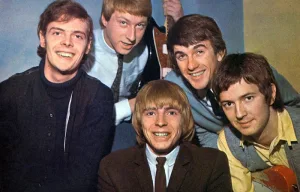 Did the “Clapton is God” graffiti and the hype around Eric Clapton create tensions within the band?
Did the “Clapton is God” graffiti and the hype around Eric Clapton create tensions within the band?
Not really. He always had a very high profile, he was very interested in how he came over on stage, the way he presented himself and the way he dressed. He was different to the rest of the group because he was so conscious of all that, which he made him quite different. So, he was quite ambitious and he was always gonna be on his own. He wasn’t someone that was happy in a group. You know what I mean? He was always gonna be a solo player.
Was it an interesting experience to play in Antonioni’s “Blow-Up” (1966) film?
It was very interesting because we went to the studio and we were booked to go to a studio that was up in North London and when we got on the set, it was a complete copy a club that we used to play in called the Ricky-Tick club, which was down in Windsor, which was just outside London, so, walking on the set was like walking into the club, it was very odd. Antonioni was very perfectionist, he wanted everything to be just right, so, we ended up doing that little bit in the movie; it took about five days to do that. It was very odd the way he was looking at it, because he had the audience all standing there and they were looking at the space, which wasn’t true in terms of our shows, because they were all jumping around most of the time (laughs). It was odd but it was a good film to be involved with because it had that art high quality to it.
It is true that Jeff Beck didn’t want to smash his guitar in “Blow-Up” (1966) film the way Pete Townshend did?
Yes, yes, he didn’t like that. It wasn’t natural to him to smash the guitar. If he smashes the guitar, he will lose his tempo. It was for real, but, he didn’t like acting it out and I think it was quite difficult for him. We were doing a tour with the Rolling Stones and they gave us a whole lot of cheap guitars to practice on (laughs), and yes, it was very awkward, it wasn’t that natural for him to do that.
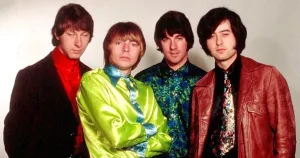 You are responsible for playing Jake Holmes’ “Dazed and Confused” in your shows. What’s the story behind this?
You are responsible for playing Jake Holmes’ “Dazed and Confused” in your shows. What’s the story behind this?
We were struggling at the end of The Yardbirds, where we had a 4-piece line up; Jeff Beck and Paul Samwell-Smith had gone and Jimmy Page was playing the lead and we looking for the usual, we needed another hit record and we had gone to Mickie Most (ed: The Animals, Donovan, Jeff Beck Group producer) who came up with all these terrible ideas that didn’t really work. We just happened to be playing in New York with this folk singer called Jake Holmes and I was standing at the back when he was playing and it was all very folky jazz music and then he played this song with this descending eerie riff and I thought: “Oh, that sounds good. That sound is a thing that we can do” (laughs). So, I went down to a record store the next day in Greenwich Village and I bought this vinyl album, it was called “‘The Above Ground Sound’ of Jake Holmes” (1967) and “Dazed and Confused” was on it, so, we worked out our version and we used to play it (laughs).
Does “Yardbirds ‘68” (2017) live album capture the true spirit of a Yardbirds concert?
Yeah, I was very surprised because as I said we were near the end of our life as The Yardbirds then and we were all very tired and I thought: “Oh, I don’t remember that concert being very good”, but when I heard the remixes of it that Jimmy had done, I thought: “This sounds really good, this sounds refreshing”. It sounds good and I can understand it, I understand why he wanted it out.
What was the difference between Eric Clapton, Jeff Beck, and Jimmy Page as players and as personalities?
Well, they were all very different. Eric was a very dedicated blues player and he loved the blues. He was very dedicated, he practiced all the time and he loved that stuff. Also, he was very concerned, as I said, with his image, how he looked and how smart he was. Jeff, on the other hand, he didn’t really care. He just wore dirty old clothes, whatever he was happy in, jeans or a T-shirt or whatever, but he played differently and he played a variety of styles and very much off the top of his head, he didn’t work it out. He just played and he played wonderful stuff. Jimmy Page was much more organised, he used to play on sessions, so, he played what you wanted or what was required and he worked it all out and he edited it all down. He was very business-like about it. He was probably quite wild in Zeppelin, but he wasn’t that really wild with us, he was very-very easy-going.
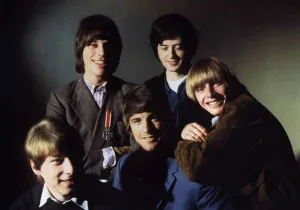 What does the 1992 Rock and Roll Hall of Fame induction of The Yardbirds mean to you?
What does the 1992 Rock and Roll Hall of Fame induction of The Yardbirds mean to you?
I was very proud, I didn’t think we would ever get anything like that. We were always very underrated, I thought, as a band. They tried to induct us the year before I remember, in 1991 and we didn’t get in, we didn’t get voted, but the next year we got voted in and it was great because we got voted in with Jimi Hendrix, Johnny Cash, who was one of our idols and Booker T. and the M.G.’s, fantastic bands and I was very proud to be inducted. It was very nice occasion meeting all these great rock ‘n’ roll stars.
Did you have fun making the “Birdland” (2003) album?
Yeah, I thought it was good, it was a lot of work. We wrote some newer songs, there were a lot of people involved, a lot of other guitar players, mainly through Steve Vai, because it was Steve’s record company (ed: Favored Nations) and we recorded it in his studio in Hollywood. Yes, it was good fun, it took a long time and it was a bit of a shame it didn’t do better. We were a little bit upset about that, it didn’t really sell so many thousand records (laughs), but people liked it, I thought it was a good album.
Do you remember the Athens concert of The Yardbirds in 2003?
Yes I do, we played at a club (ed: Gagarin) there and I think we went to Thessaloniki, we played a couple of dates. I always loved Greece because I used to go sometimes to the Pelion for holidays.
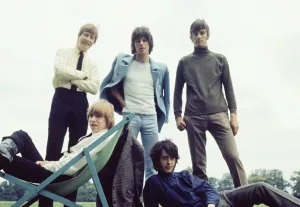 Roger Waters from Pink Floyd has a house there and Boris Johnson, your ex-Prime Minister.
Roger Waters from Pink Floyd has a house there and Boris Johnson, your ex-Prime Minister.
Really, is he (ed: Boris Johnson) in the Pelion?! (laughs) I know Roger has one, yes. I’ve met him a few times but I didn’t see him in Greece. To be honest, I never went to the Greek islands, I’ve been to the mainland, I thought it was lovely, I really liked it. I love somewhere like Delphi with all the old statues.
I’m in Southern Greece, near Ancient Olympia, in Peloponnese. Steve Hackett (Genesis -guitar) has been to Olympia with his wife.
In Olympia?! Great! Terrific, lovely, I think it’s a beautiful place. Yes, yes, I love Steve. Steve is great. Steve is my friend, he has played on a couple of my solo tracks, he is a good guy.
What was the greatest skill that Keith Relf (vocals -died in 1976) had?
He was a good harmonica player and he had great ideas and he could make it all up. He was very good on stage because he had a lot of ideas and he could play all over the place and he could sing. He was very good at improvising, he was a bit like Jeff, they were improvising a lot at the time and playing off each out. They worked well together, him and Jeff.
 Were you shocked by the news of Jeff Beck’s death in 2023?
Were you shocked by the news of Jeff Beck’s death in 2023?
Yes, it was terrible! It was a real shock. It was horrible and I couldn’t do anything for a few days, it was so awful. I couldn’t understand it because he was doing so well and he was very busy, because for many years he hardly played at all, he used to hang around at his house. But he got busy in the last ten years or so and it was a great shock because he wasn’t really that old.
Did you get on well with Peter Grant (future Led Zeppelin manager) when he managed The Yardbirds?
Yes, he was good. He was always very pro to the group, he always made sure that the group got paid, he looked after the group and he used to travel around with us and he was a good person.
When Jimmy Page and John Paul Jones initially decided to form a new version of The Yardbirds with the then-unknown John Bonham and Robert Plant did you expect that they would become so popular?
No, no! (laughs) Not really, because as far as I was concerned they were playing the same as us, and for me, I suppose I was very tired, I got fed up with it and I wanted to do something else. So, I was surprised but of course there was a lot of mileage in that sort of music and they became really big, didn’t they? Somebody came around to my house, they were doing a book about the Zeppelin, it was like a few months later and he showed me these photos. They had the record number of people somewhere, thousands of people and I said: “Oh no, dude! We left. Leave half of it for us”.
What was the musical vision you had when you formed Renaissance?
It was definitely to do something different. We had ideas to do something like “Hair”, the musical and a bit like the Fairport Convention or something like that, that sort of style but different. Of course, it came out different mainly because of John Hawken (keyboards), because he started to play classical piano in one of the songs and we thought that was great. So, he really created that classical prog rock sound which was unusual, so, we went from there.
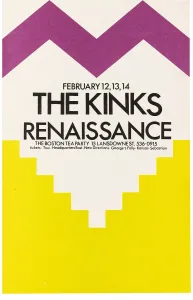 Did you enjoy the Renaissance tour with The Kinks in 1970?
Did you enjoy the Renaissance tour with The Kinks in 1970?
Oh, yes! It wasn’t really a tour, we played in America, yeah. It wasn’t a tour but we played a couple of times with them. Yeah, it was good, but we played with The Kinks already in The Yardbirds on a tour. We got on very well with them.
How much impact did the “Jimmy Reed at Carnegie Hall” (1961) album have on you?
That was the first time I heard anything quite like that. Paul Samwell-Smith, the bass player, took me around his house and played it and to me that was great, it was a wonderful feeling, a blues feeling and a rare excitement. I thought it was a great album.
What was the idea behind Box of Frogs?
We (ed: The Yardbirds members) were getting back together here and there and we did a concert at the Marquee which was the 20th anniversary of the Marquee and we got back together Paul (ed: Samwell-Smith -bass), Chris (ed: Dreja -rhythm guitar) and myself, we got other people in and then we started writing songs and it all developed. We worked with John Fiddler (ed: Medicine Head -guitar, vocals) and we had some songs and more and more and then we ended up recording a full-blown album (ed: “Box of Frogs” -1964), which was fun and we brought Jeff Beck into the picture, Steve Hackett, Rory Gallagher and these other musicians. Good fun.
What memories for you have from your collaboration with Rory Gallagher on Box of Frogs albums?
He was great to work with. He liked to drink quite a lot; he would drink Jack Daniels, you know (laughs), but he was a very nice guy and a very good player. He played on a version of “Heart Full of Soul”, we did a bit different version (ed: on “Strange Land” -1986), I remember. He played on some good stuff and he played well.
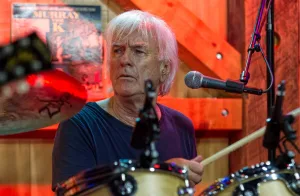 Who are your influences as a drummer?
Who are your influences as a drummer?
I used to like all the ‘60s drummers. I like jazz, I like the drummer in Dave Brubeck Quarter, Joe Morello. I like all the drummers: Art Blakey, Gene Krupa, all the jazz stuff and then I liked people like Hal Blaine (Frank Sinatra, Elvis Presley), who was a great session drummer and he played on a lot of records, he played on The Beach Boys records and all that stuff and he was a great drummer. And of course, Keith Moon, Ginger Baker and John Bonham, they were always great, all the English rock drummers, they were good.
What was like to be a musician in London in the Swinging Sixties?
(Laughs) Very hectic, really. It was very-very busy because you didn’t know where you were, you were travelling around and you were doing photo sessions and then you would go recording and then playing a show and then you would end up in a late night club, so, it was very-very active and it was quite exciting, but it was a bit like being in a whirlwind (laughs), you know, all going at the same time.
George Harrison’s music, Jimi Hendrix’s music, Santana’s music, had also a very strong spiritual aspect. Is today’s music spiritual?
I don’t know about today’s music (laughs). There are some clever things. Taylor Swift is quite clever at what she does and presenting herself. There are some good things… There aren’t really so many young bands around but you hear interesting things sometimes. But I don’t know about the spiritual thing (laughs), you don’t hear that too much.
Did you get to know people like Jimi Hendrix or Brian Jones?
Yes, more Brian Jones. I think Brian wanted to be our manager one time, he was quite interesting. I didn’t really know Jimi Hendrix but I did meet him, he was nice, he was very quiet, not like he was on stage (laughs).
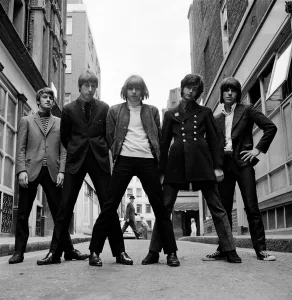 Did you like drummers from your era like Charlie Watts and Ringo Starr?
Did you like drummers from your era like Charlie Watts and Ringo Starr?
Yes, yes! Yeah, I would see Ringo or Charlie somewhere, here and there, they were always friendly. They were very basic drummers, they kept it all together, they kept the group together, they were very steady.
Are you optimistic about the future of the blues?
Yes, I am. It’s very diverse now, isn’t it? Blues is coming from everywhere, is not necessarily Black, I think Buddy Guy is the last guy standing. There is Joe Bonamassa who seems to be one of the leading players and there are a lot of different white blues players, but I think the blues will carry on. It’s always so exciting.
A huge “THANK YOU” to Mr. Jim McCarty for his time.
Official Jim McCarty website: https://www.jamesmccarty.com/
Official Jim McCarty Facebook page: https://www.facebook.com/people/Drummersingersongwriter-Jim-McCarty-of-the-Yardbirds-and-Renaissance/100063451668431/
Official Yardbirds website: https://www.theyardbirds.com/

